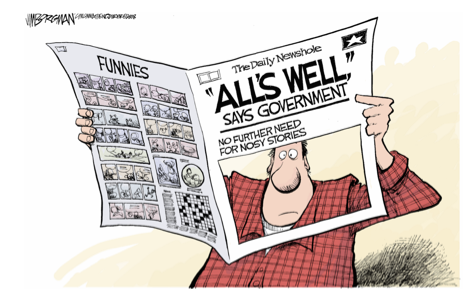CommentsCAL MATTERS--If we – the California public – are to hold politicians and other government officials accountable, we must first know what they are doing or not doing.
Thus, the first point of conflict is always access to records of official action or inaction.
The current legislative session is the first one affected by a 2016 ballot measure (Proposition 54) that requires final versions of bills to be in print for 72 hours before lawmakers vote on them. They – particularly the dominant Democrats – don’t like it because it makes sneaking legislation through the process more difficult.
They’ve devised some hide-the-pea ways around the 72-hour rule, such as making private deals that are not written into the affected measures but are enacted later in separate bits of legislation. The Senate is being relatively respectful of the voters’ overwhelming vote for Proposition 54, but the Assembly is thumbing its nose at them with procedural rules that allow some bills to evade the 72-hour regulation.
And then there’s the Public Records Act, California’s landmark law giving the public, mostly via news media, access to official documents, with some exceptions.
Unfortunately, the list of PRA exceptions seems to be growing as legislators, who are not inclined toward openness in the first place, protect their fellow officials and/or do the bidding of powerful interests.
The current session has had 79 bills involving the PRA. While most of the proposals amount to innocuous boilerplate, the Legislature is moving those that create more exceptions and blocking those that would expand access.
A prime example is Assembly Bill 1455, which would prohibit access to local government documents relating to collective bargaining negotiations between local officials and their unions, mirroring the blackout on records of state and higher education bargaining.
Powerful public employee unions want the records sealed because they fear backlash should the public know the tradeoffs in labor agreements. The bill would overturn an Orange County court decision that the records are subject to the PRA.
An example of killing better access is Assembly Bill 1479, which would have provided civil penalties for officials who thwart PRA requests for documents. Mysteriously, the penalty portions of the bill vanished on Sept. 1.
“The penalties were the whole point,” said David Snyder of the First Amendment Coalition, which sponsored the proposal. In its current form, the bill would leave officials free to stall and obfuscate on records requests.
Another notable bill would limit disclosures to protect undocumented immigrants (Senate Bill 244). It represents one of the enduring conflicts on the issue between privacy and the public’s right to know.
That conflict also popped up in a budget-related measure (Senate Bill 88), already signed into law, that gives unions access to more personal information about public employees to aid membership recruitment but blocks the same data to anyone else. A pending U.S. Supreme Court case may prohibit unions from collecting dues from non-members, and the Senate measure would impede efforts by anti-union groups to contact employees.
Another newly signed law (Senate Bill 92) clamps secrecy on “emergency action plans” for dam failures, supposedly to thwart terrorists but more likely to protect officials from embarrassment. It was sparked by the near-failure of Oroville Dam earlier this year.
Meanwhile, opposition from police unions and other law enforcement groups blocked legislation (Assembly Bill 748) that would have required video footage from police shootings and other major incidents to be released.
“The patchwork releases of body camera footage only sow further public distrust with law enforcement and the communities they serve,” the bill’s author, Assemblyman Phil Ting, a San Francisco Democrat, said in a statement.
The same could be said for all efforts by officials to cloak their actions in secrecy.
(Dan Walters has been a journalist for nearly 57 years, spending all but a few of those years working for California newspapers. He has written more than 9,000 columns about California and its politics. This Walters perspective originated at CalMatters … a nonpartisan, nonprofit journalism venture committed to explaining how California’s state Capitol works and why it matters.)
-cw















